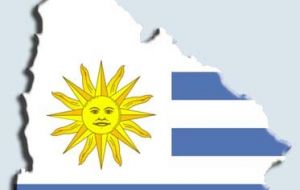MercoPress. South Atlantic News Agency
Firm vote intention support for Uruguay's opposition

Vote intention for Uruguay's main opposition party continues to inch upwards according to the latest public opinion polls while the ruling coalition suffers sustained but gradual erosion. Uruguayan presidential and congress elections are scheduled for October 2009.
The Interconsult poll results published in the Montevideo media shows the National Party with a vote intention of 35%, while the ruling Broad Front figures with 41%. Compared to the previous opinion poll last June, the opposition party has advanced three percentage points while the ruling coalition is down one percentage point. A third political party the Colorados figure with 7% and the Independent Party with 1.7% of interviews. Interconsult poll also shows that 15% of those who voted for the Broad Front in October 2004 remain undecided about the 2009 election. In 2004 the Broad Front a catch-all coalition extending from Christian Democrats to Communists, former guerrillas and radical groups broke the National-Colorado parties' hegemony that has ruled Uruguay since it became an independent nation in 1830. Furthermore the victory was in the first round with 50.9% of the vote thus avoiding a run off a month later. In August 2002 Uruguay suffered the full impact of the melting of neighboring Argentine economy and experienced a serious financial and banking crisis which was helped out by a 1.5 billion US dollars bridge-loan from the United States Treasury followed later by strong support from the IMF. Bank deposits were frozen and rescheduled, with some investors in private financial institutions loosing their funds, while the economy contracted 20% and unemployment soared to over 25%. Although 18 months later Uruguay was back on the recovery track and has not ceased to grow since then, the impact of the financial and banking crisis and general disenchantment with the Colorado party are believed to have helped the Broad Front win the elections. However another theory from political scientists shows that the catch all coalition was in a sustained advance election after election period and ultimately would have the necessary votes support to win, as effectively happened. Actually a 1996 constitutional reform which imposed the two rounds system with a run off between the two most voted presidential candidates if none received 50% plus one of votes cast, delayed the Broad Front victory another period (October 1999). Uruguayan president Tabare Vazquez, a charismatic oncologist who was mayor of Montevideo and leader of the Broad Front has managed to see his personal support and performance approval soar to an exceptional, by Uruguayan political standards, 57%, in spite of the coalition's erosion to 41%. The Intercounsult interviewed 880 households between August 9 and 11 in Uruguay's main urban areas (with more than 5.000 people).




Top Comments
Disclaimer & comment rulesCommenting for this story is now closed.
If you have a Facebook account, become a fan and comment on our Facebook Page!